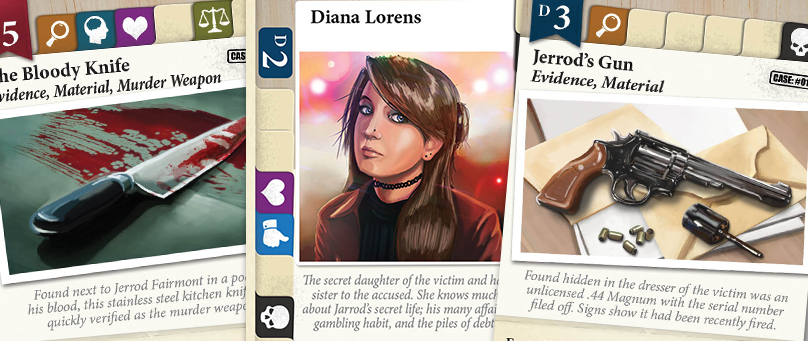
Afternoon Cable Justice
The law is rather unfamiliar to me outside of televised procedurals and high school civics class. More than a few fellow English students have fallen under its sway as they moved through academia, drawn to the intricacies of spidery language and textual analysis, something that cloth-cut board gamers equally appreciate. So I’m somewhat surprised there hasn’t been a major law-themed board or card game that’s floated to the top just yet.
Perhaps it’s that these tracks are too nearly parallel, burying a game’s fun in heaps of nitpicking, which loses its luster in daily application already. There’s also a potentially high barrier of entry, and the difficulty of convincing other players to read rules tomes before getting into the grease with you. Regardless of what’s kept a card-based metaphor of practicing law from hitting kitchen tables across the globe in the past, Rock Manor games are toiling under green lampshades to fill in the gaps, by preparing their upcoming modular card game Lawyer Up for Kickstarter.
Everything we’ve learned from decades of media comes into play here. Arguments, evidence, sidebars, witnesses, objections, and more all land on the table. But the heart of Lawyer Up beats to the rhythm of a game, not unlike the classic War where each player stacks card after card to bolster their half of the examination of a witness. The cards you can play are determined by those previously played, and ultimately each player is vying for the bias of the jury and to claim a witness. Everything else is in service to this, though the end zone is regularly shifting, so there is little to depend on fully.
Randomness plays a big role in shifting one playthrough from the next, but overall Lawyer Up does a great job of painting mechanics in caselaw tones. The pre-trial phase has players appending case-specific cards their base deck, “sharing” one to the other side, and burying a third that will potentially (but not assuredly) never be used. This creates the body of each case and deck, which you will draw from and add to and generally want to exhaust by the time the trial is over, because it gains you influence.
Each expansion holds a distinct mix of cards, and ranges from murder to art forgery, prohibition, and Salem witch trials as the planned options for now. In each, influence determines your sway over the jury, and who controls the jury controls the outcome of the case. With one side as the prosecution and the other as defense, there’s a fair shake of asymmetry here, not the least of which is that of the twelve jurors, the defense only needs to have one in their corner to take the whole thing. So the prosecution has an edge, and might feel like they’re steamrolling the whole affair, but the defense only has to keep that one changed mind in their pocket.
The prep is quick and the back-and-forth is somewhat nimble as well, but there’s a lot to go through and account for during play. Making sure to match the biases on your cards to present a worthwhile case, claiming special effects during examinations, and tallying victory and defeat conditions. It never really felt overwhelming so much as easy to potentially skip a step, which really can tank your plan of attack. But this too sits at the center of the law, where there are rules and there is your case and it’s up to you to stay on your toes and keep the other side as honest as you can.
The law is already an impossible jawbreaker of codified layers, impenetrable to the layperson and a matter of moves and timing for the experts. Maybe there was never a need to make a game about this game (that disproportionately affects so many lives), with such a thin line between metaphor and reality. But on the other hand, this hobby excels at teaching planning, analysis, strategy, and reflexivity, and Lawyer Up mimics the source without going overboard into the absurdity. I’m eager for another go with a finished rulebook and a couple of clarifications, possibly making the game a little shorter, but overall, the high of a well-timed objection to tank the other side’s entire game plan gives the same thrill as watching it on afternoon cable, or on a classic VHS from the 90’s. I, for one, will allow it.





